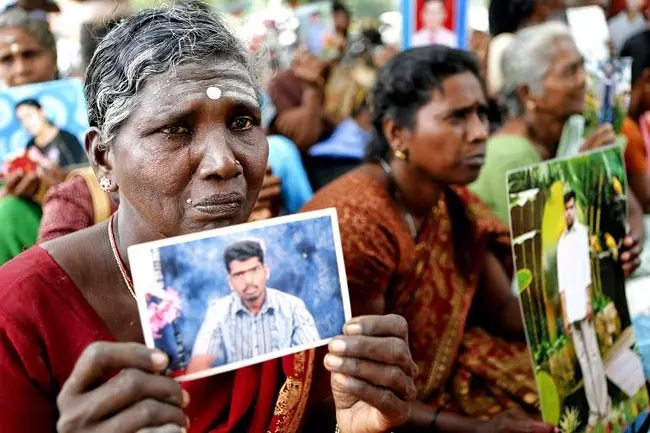
International groups flay Sri Lanka, urge end to human rights abuses
Sri Lanka was pressed to engage with the victims of human rights violations and their families, and deliver a transitional justice process that upholds their rights

Nine international groups have come out with a strong condemnation of Sri Lanka’s continued violation of human rights and have urged it to probe, with global participation, enforced disappearances and mass graves.
A joint report issued by the groups also asked Colombo to uphold its legal obligation to prosecute those suspected of criminal responsibility for crimes under international law and gross human rights violations.
Sri Lanka was also pressed to engage with the victims of human rights violations and their families, and deliver a transitional justice process that upholds their rights.
Colombo, it said, should demonstrate its commitment to providing truth, justice, reparations and guarantees of nonrecurrence by immediately ending human rights violations against victims’ families and communities.
Sri Lanka has been under intense international scrutiny ever since it militarily crushed the Tamil Tigers in 2009, killing also in the process thousands of innocent and non-combatant Tamils.
UNHCR meet
The report, authored among others by Amnesty International, Human Rights Watch, International Commission of Jurists and International Working Group on Sri Lanka, was released on Monday ahead of the 54th session of the UN Human Rights Commission starting in Geneva on September 11.
The report expressed grave reservations about Sri Lanka’s proposed National Unity and Reconciliation Commission, saying none of the similar bodies set up earlier have led to justice, truth or reparation to those who engaged with them.
“The latest initiative risks repeating the mistakes of the past, exposing victims to renewed security threats and re-traumatization without any realistic chance of a different outcome,” it said.
The report faulted Colombo for not providing any genuine confidence-building measures or steps to ensure a safe and conducive environment for such a commission to function effectively.
Moreover, existing domestic transitional justice mechanisms such as the Office of Missing Persons were unable to function effectively and there were ongoing attempts to block prosecutions of crimes under international law, it said.
To Pakistan
It pointed out how in July Sri Lanka appointed retired admiral Ravindra Wijegunaratne as High Commissioner to Pakistan, despite a court order for his arrest in connection with the abduction, torture and murder of innocent suspects.
The report quoted the UN High Commissioner for Human Rights as saying that “numerous commissions of inquiry appointed by successive governments failed to credibly establish truth and ensure accountability”.
“There is no indication in the government’s current proposals for a National Unity and Reconciliation Commission, or in the manner and circumstances in which it is being established, to suggest that it will be willing or able to provide truth, justice or reparation where previous commissions have failed,” it said.
“Many victims and their relatives have already engaged in multiple similar processes over decades. The current proposals risk further re-traumatization, with little expectation that victims’ rights and needs will be addressed,” it added.
The rights groups complained that in Sri Lanka’s north and east, which was the war theatre, victims of gross human rights violations such as enforced disappearances and unlawful killings and their families as well as rights activists face routine surveillance, harassment and intimidation by security and intelligence agencies.
North, East
Also, in the Tamil-majority northern province and the multi-racial eastern province, state agencies were engaged in a campaign of land grab targeting the property and religious sites of minority communities, the report said.
“In this environment, it is not possible to conduct a credible truth-seeking process in which communities that have faced discrimination and violence for decades can participate with confidence and in safety.”
The report urged other countries to call for an end to ongoing violations and for substantive confidence-building measures in Sri Lanka to ensure that victims are able to participate in any future reconciliation and accountability process safely and with confidence.

